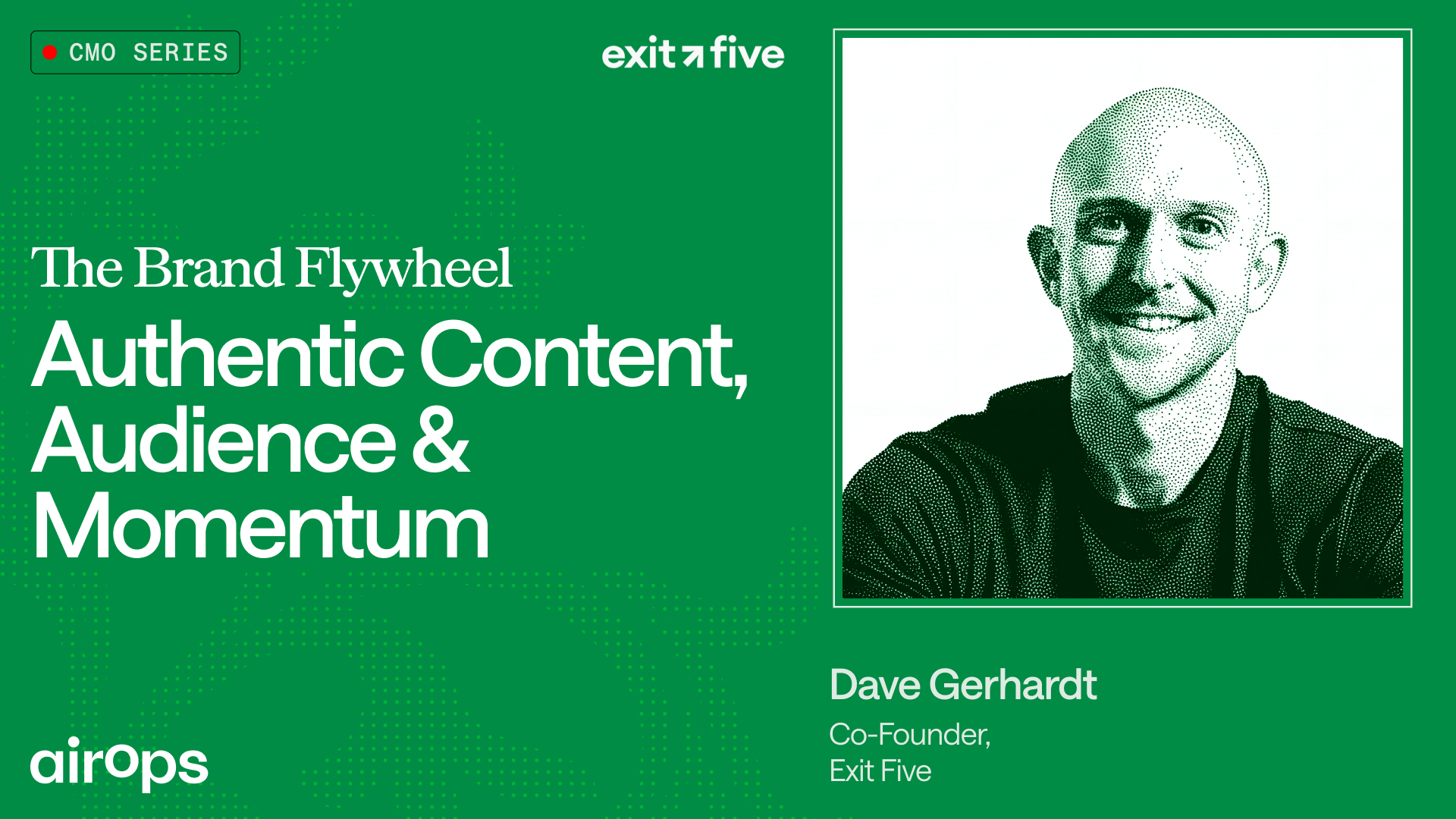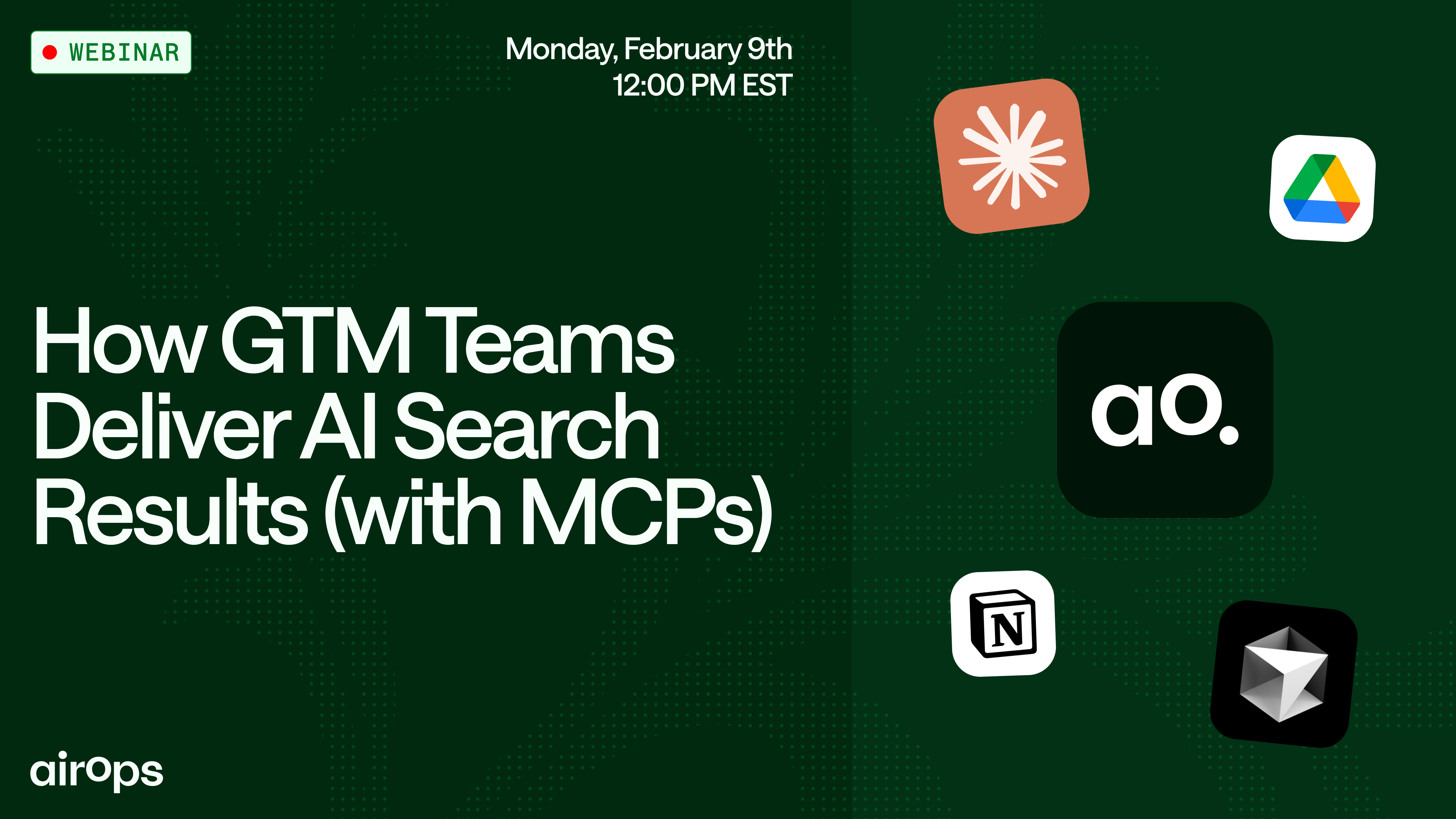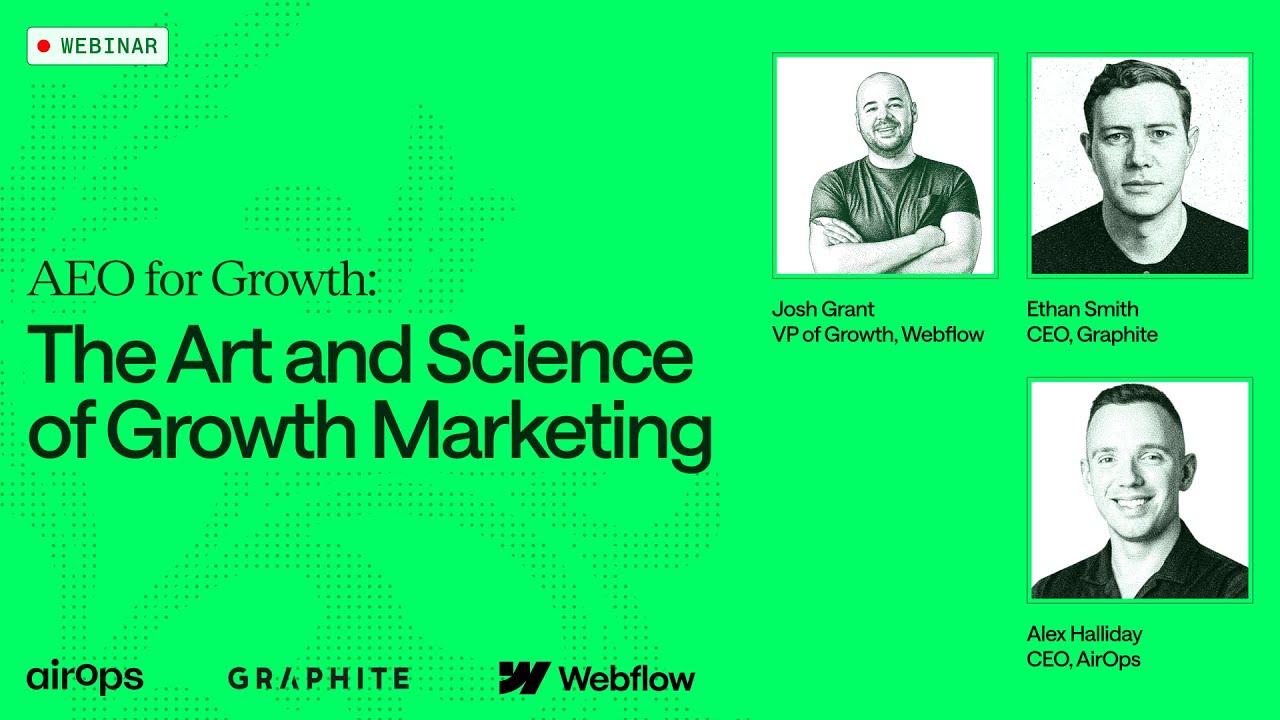Webinar Recap: How to Win The AI Search Shift with Ethan Smith & Alex Halliday
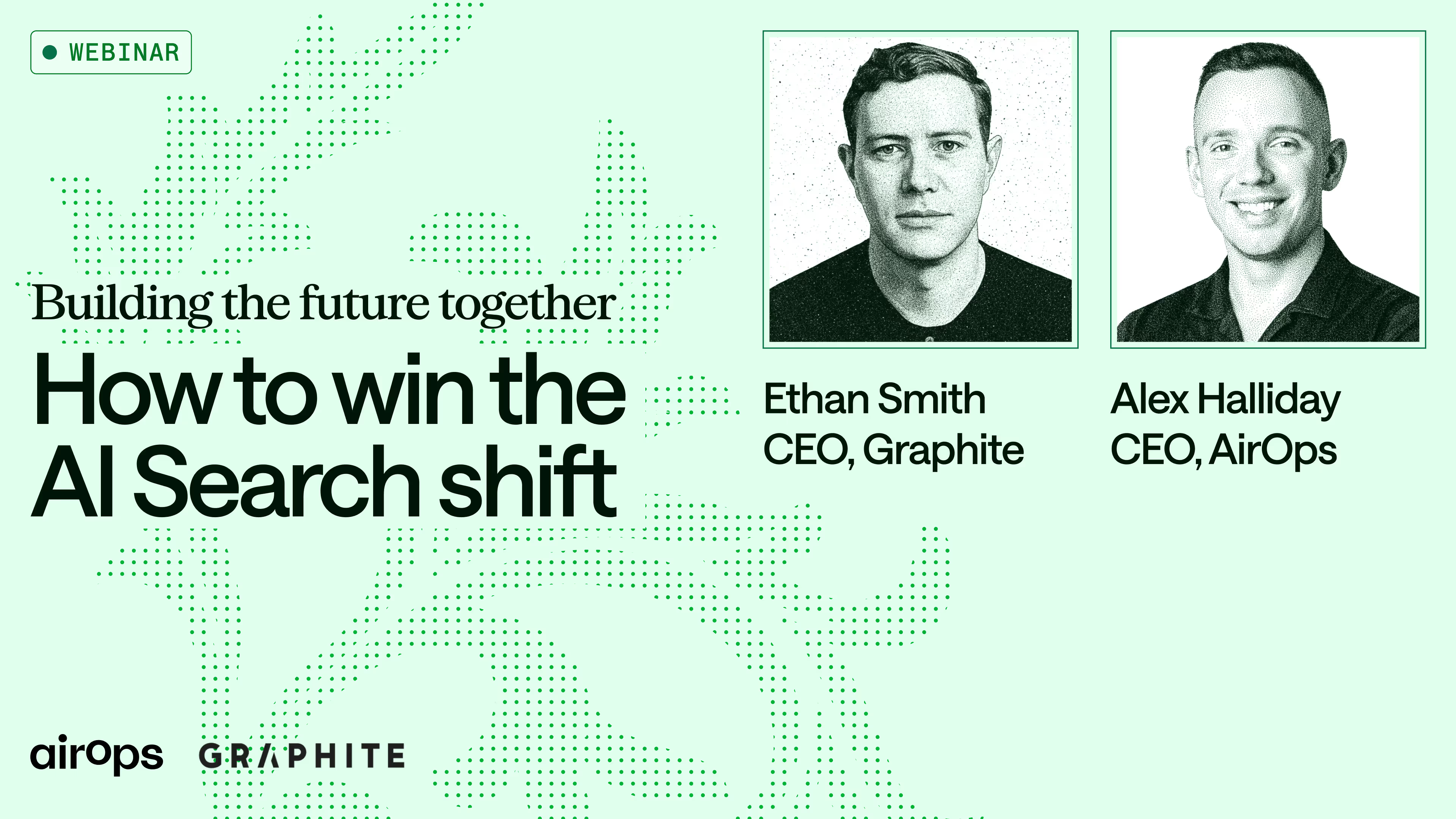
In this AirOps webinar, Alex Halliday (CEO of AirOps) and Ethan Smith (CEO of Graphite) talk with Josh Spilker (Content & SEO at AirOps) about the practical strategies that work in AI search.
The conversation focuses on what's actually changing in search visibility and the specific tactics content teams should implement now.
Don't forget! Get your free copy of the Complete AI Search Playbook for Marketers.
Top Takeaways
1. Semantic Search Was the Original Shift, and AI Is the Next Wave
Google’s shift from exact-match SEO to semantic search was the first major reset. One strong, authoritative page could suddenly rank for hundreds or thousands of keywords. AI search is accelerating that same trend rather than replacing it.
As Ethan explained, semantic SEO and the shift from keywords to topics was the biggest transformation in search. AI represents the second, and it’s rapidly compounding that trajectory.
2. AI Chat Interfaces Are the New Visibility Gatekeepers
ChatGPT, Perplexity, Rufus, and Cursor now sit between you and your buyer. More of the evaluation process happens inside these interfaces, which means visitors arrive deeper in the funnel but you lose visibility into their research path.
“It really inserts a new visibility broker between brands and their next customer.” — Alex Halliday
Examples from the webinar highlight how large the shift already is:
- Webflow is seeing ~8% of total signups from AI chatbots
- Early-adopter B2B and developer tools are consistently in the 8–10% range
- Some CPG brands are still under 0.5%, showing how category-dependent this shift is
Conversions are also unusually strong. The average ChatGPT prompt is ~60 words long, and is high-intent, highly specific, and primed for purchase.
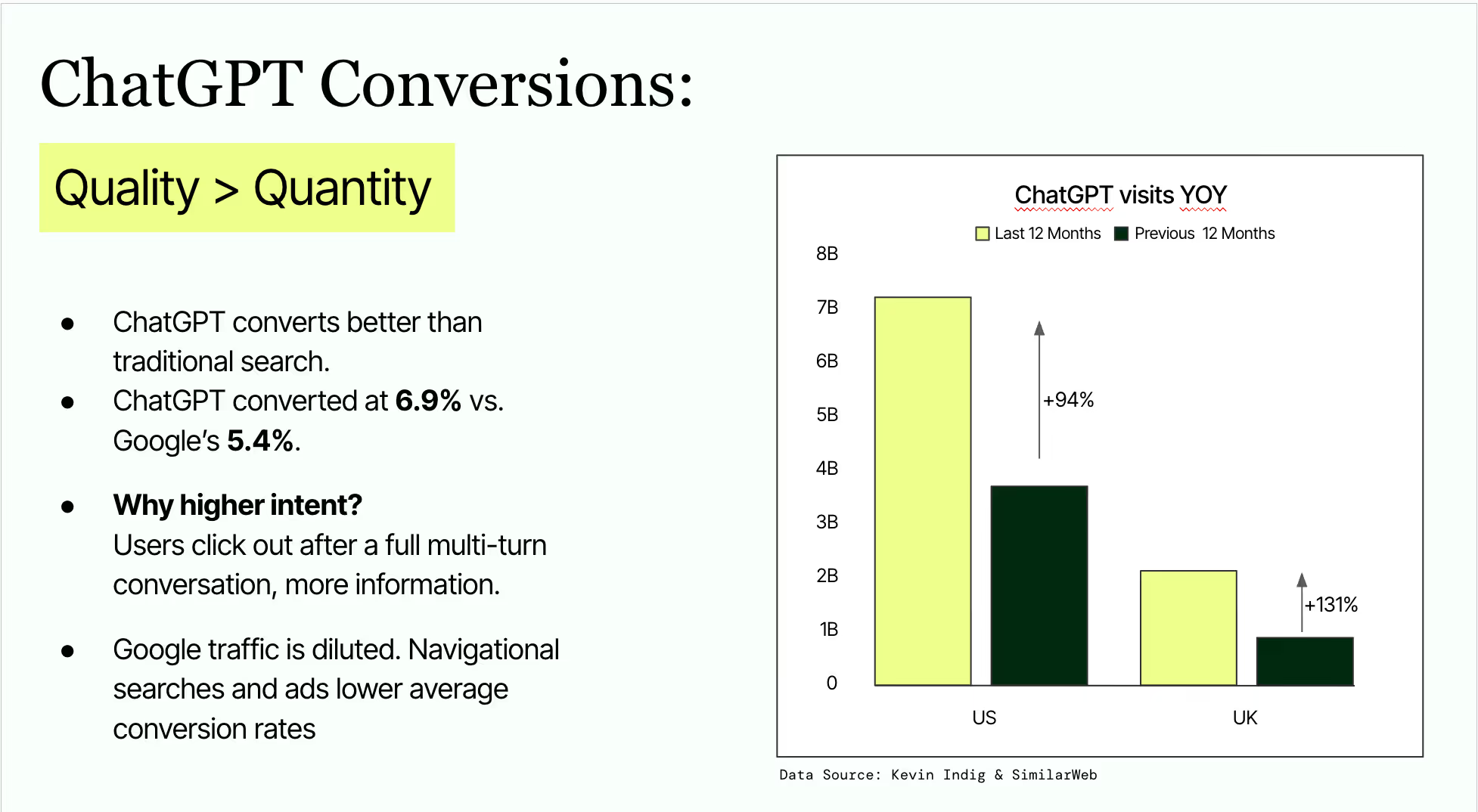
3. Questions, Not Keywords, Are the New Content Blueprint
User intent now lives in questions from sales calls, support conversations, Reddit threads, and social platforms. Content teams must answer real questions directly while avoiding the new version of keyword stuffing: question stuffing.
But Alex noted that teams must look beyond tool-generated question sets. Look for frontier questions. These are new questions emerging across sales calls, support logs, Zendesk, Gong, and Reddit that shift constantly and need to be tracked over time.
4. Content Must Be Structurally Quote-Friendly for LLMs
LLMs reward clarity and clean structure. Pages should use question-based headers, bullet lists, tables, grouped FAQs, and basic schema so models can easily extract the information users are asking for.
“What you're really doing is you're trying to kind of make sure your content, to the extent possible, is prepared for citation, and we really want to become the answer that the models cite.” — Alex Halliday
Alex also emphasized a technical detail that many teams ignore:
“JavaScript's not rendered, and so any content that requires JavaScript to be loaded will not be seen by the LLM, so don't use any fancy AI optimization tools that sit on your webpage with JS. They don't help with LLM answers at all. It has to be in the foundational HTML and easily readable." — Alex Halliday
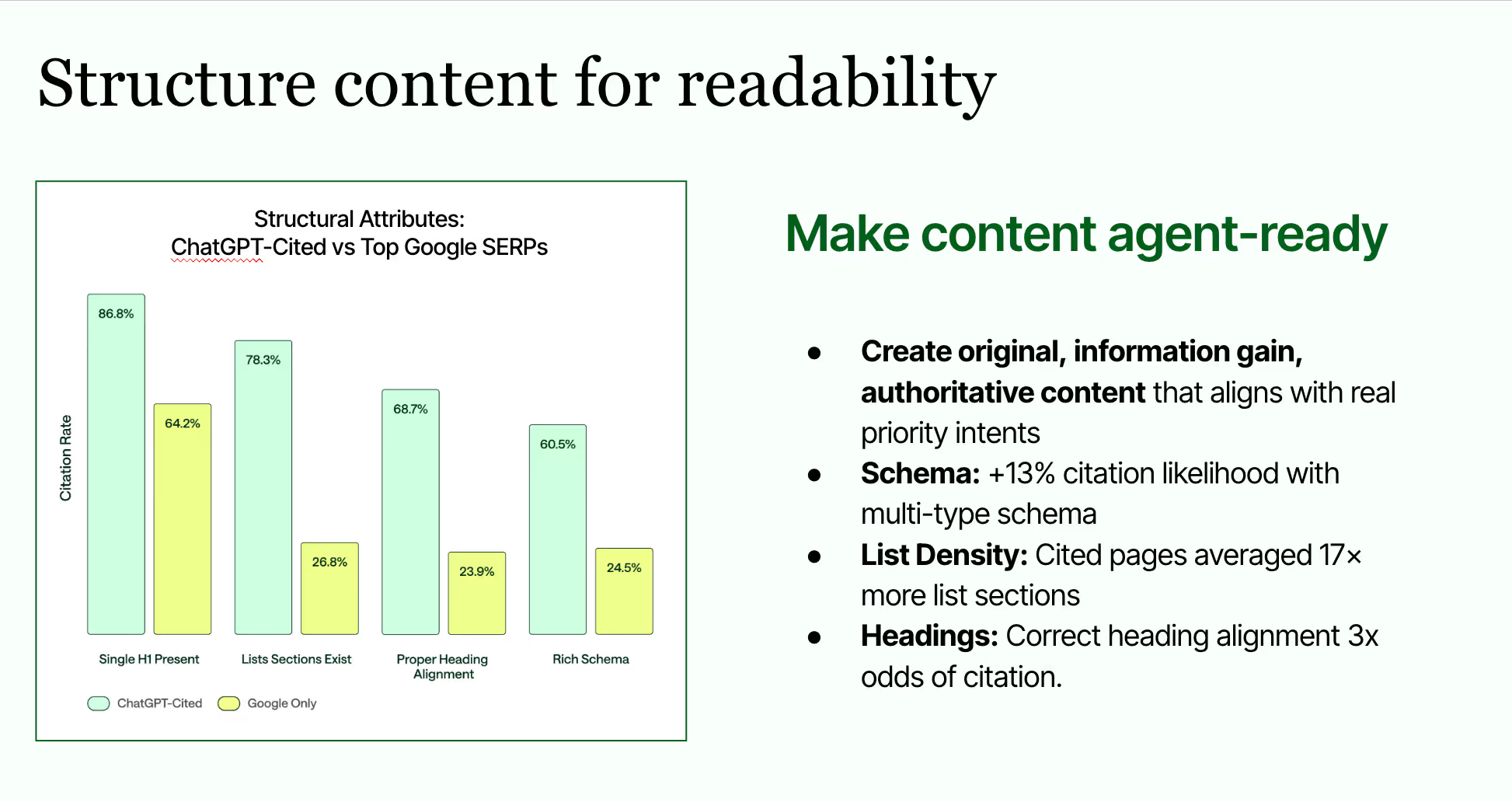
5. Freshness Signals Are Increasingly Weighted in AI Answers
Models rely on the most recent credible information when they reach outside their training data. Precision refreshes, updated statistics, and strong “last updated” hygiene help ensure your pages stay relevant and visible.
Alex noted that even traditional search models—like Bing’s RAG system—are increasing freshness weightings because LLMs rely on timely data when they fan out to search.
6. Third-Party Mentions Now Play an Outsized Role in AEO
Ranking first in Google is not enough. Models look for multiple independent signals. Off-site content on Reddit, YouTube, LinkedIn, industry sites, partner channels, and PR placements all influence whether your brand is cited in high-level AI answers.
Ethan explained:
“It's not enough for the most popular questions to have your URL ranked number one. You need other people to mention you.” — Ethan Smith
Teams should prioritize off-site presence — and not rely on any single channel. Reddit, YouTube, and even niche industry forums can be influential depending on category.
Video is especially powerful. YouTube is one of the top-cited domains in LLM responses, and as Ethan noted, “the less entertaining your product is, the more opportunity there is on YouTube.”
7. Controlled Experiments Will Define the Winners in 2026
Teams should run prompt-level tests with clear control groups. Experiment with changes such as video embeds, FAQs, question-based headers, Reddit participation, or integrations. The metrics to watch are citation pickup and visibility movement compared with the control. If everything moves, including the control, the model changed and the experiment didn’t win.
Best Practices and Key Learnings
AI search is evolving fast, but there are clear strategies to help teams adapt. Here's what stood out from the conversation.
Don’t abandon classic SEO
Ethan emphasized that SEO remains a durable, high-value channel and most SEO work “works for free” in AEO.
Teams should:
- Maintain strong domain authority and topical depth
- Continue investing in evergreen content
- Treat AEO as an expansion, not a replacement
Focus on originality and off-site authority
Brands can't rely on traditional SEO alone. Off-site mentions and authority across multiple domains now drive visibility in AI search.
- Build relationships to earn citations from trusted third-party sites
- Invest in video and social proof on platforms like YouTube and Reddit
- Monitor which domains influence your category and target them strategically
“LLMs want diversity of opinion and wisdom of the crowd, and a lot of SEO content is me rewriting your article. So, like, a lot of Google searches is derivatives of derivatives, and Google and LLMs want diversity.” — Ethan Smith
“Understanding the relative influence of different domains and publishers on the model’s answers helps you see where you should place your chips for the next cycle of work.” — Alex Halliday
Structure and refresh content for answer engines
LLMs value content that's well-structured, current, and comprehensive. Teams need to update both strategy and execution.
- Use clear, question-based headings and group related FAQs without overdoing it
- Add unique insights, statistics, and up-to-date information to stand out
- Regularly refresh content for accuracy and freshness
Build third-party mentions and social proof
User-generated content and off-site authority are now heavily weighted by LLMs. Brands need to be part of the broader conversation.
- Develop a strategy for earning mentions on Reddit, YouTube, and industry forums
- Encourage authentic reviews, testimonials, and discussions about your brand
- Track where your brand is cited and identify new gaps
Experiment and measure what matters
Success in AI search depends on continuous testing and tracking new metrics and not just legacy SEO KPIs.
- Run controlled experiments to identify tactics that actually improve visibility
- Track share of voice, citation quality, and domain influence across answer engines
- Adapt quickly as LLM behaviors shift
How to put these insights into practice
AI search is shifting the landscape for content and SEO teams. Brands must adapt quickly, focusing on originality, off-site authority, and continuous experimentation to stay visible as LLMs reshape user discovery.
To succeed, build a culture of testing, invest in comprehensive content, and expand your presence across influential third-party platforms. By tracking the right metrics and staying flexible, your team can capture new opportunities as search evolves.
Winning in the AI search era: Next steps for content and SEO leaders
The future of search belongs to brands that combine strong on-site content with off-site authority and a culture of experimentation. Prioritize originality, refresh your content, and expand your reach across channels to win with answer engines.
Want to see how AirOps helps teams do exactly that? Book a call to get started.
Win AI Search.
Increase brand visibility across AI search and Google with the only platform taking you from insights to action.
FAQs
Get the latest on AI content & marketing
Get the latest in growth and AI workflows delivered to your inbox each week


